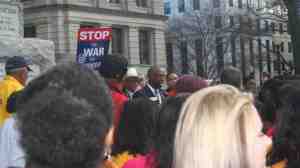 Georgia’s proportion of unionized workers is four percent, tied for forty-eighth and close to the bottom of the heap in the U.S., which is close to the bottom among nations that consider themselves ‘advanced’ in living standards, technology, and social conditions generally. As a result, Georgia’s wage earners make less money, have fewer benefits, and generally confront lower living standards. Few places on the continent would benefit more than the Peach State from a strong drive to increase trade-union representation.
Georgia’s proportion of unionized workers is four percent, tied for forty-eighth and close to the bottom of the heap in the U.S., which is close to the bottom among nations that consider themselves ‘advanced’ in living standards, technology, and social conditions generally. As a result, Georgia’s wage earners make less money, have fewer benefits, and generally confront lower living standards. Few places on the continent would benefit more than the Peach State from a strong drive to increase trade-union representation.
Thus, the rally at Georgia’s state Capitol yesterday, called by the State’s AFL-CIO, the Atlanta Labor Council, and other organizations, was a heartening sign. On the steps of Georgia’s capitol in Atlanta, in the shadow of Tom Watson’s commanding presence, five hundred or more union members, community activists, students, and various other citizens—a widely representative sample that split fifty-fifty between men and women, was roughly equally White as Black, with a smattering of Hispanic and Native American advocates—stood up and shouted “Stop the War on Workers. “ Peace groups, revolutionary proponents, and folks just generally angry at a system that rewards greed and privilege with money and perquisites while it squeezes everyone else out of any semblance of rights and benefits that groups like unions have fought hard to attain.
Throughout the United States, the courage and strength of thousands of workers in Wisconsin has given inspiration and leadership to wage-earners elsewhere. At times, the messages of these stalwart souls, braving frigid conditions and, as often as not, a media blackout, or at least a diminution of their struggle and a distortion of their perspective in the press, is exactly what working people need to hear. “This Land Is Your Land” rings true with class-conscious solidarity and an uncompromising sense of democracy that must guide those who want decent lives.
Those who attended this gathering today articulated these and other points powerfully. “Don’t let this be a one time rally,” said one preacher near the end. ”The people inside that building(the capitol) need to know that we’ll be back, we won’t leave, we’re not going away.”
 Steve Henson, a progressive-Democratic State Senator, asked, “Why is it that all sorts of associations are OK to come and lobby us in the legislature, but lobbying for working people is not OK?”
Steve Henson, a progressive-Democratic State Senator, asked, “Why is it that all sorts of associations are OK to come and lobby us in the legislature, but lobbying for working people is not OK?”
Another legislator spoke of her five year old grandson ‘leading the way.’ He wanted to pack up to go and join the fight in Wisconsin. She continued, factually, “If you can take a vacation; if you can take a sick day with pay; if you have a right to overtime pay; you have the labor movement to thank.”
In addition to the speakers at the front—a mix of union leaders, Democratic politicians, and religious and community activists—lively outbursts from the vociferous and boisterous crowd were constant, as if a massive labor beast, wild and fierce, were roaming the street. “The people, united, will never be defeated!” “Hey, hey! Ho, ho! Union busters got to go!!”
These and other chants and catcalls were directed across the intersection of Washington Street and Martin Luther King Drive to the at most one hundred Tea Party counter-protesters whose sole coherent message seemed to be ‘Leave Poor Governor Walker alone.’
 One of the savviest local politicians in America, Billy Mitchell, capsulized the meaning of the gathering when he said, “You always get exactly the government that you deserve,” a take-off on Frederick Douglass’ famous take on power. He continued, wry smile breaking out, “I promise you that the people inside this building are paying attention to you out here, and it will make a difference.”
One of the savviest local politicians in America, Billy Mitchell, capsulized the meaning of the gathering when he said, “You always get exactly the government that you deserve,” a take-off on Frederick Douglass’ famous take on power. He continued, wry smile breaking out, “I promise you that the people inside this building are paying attention to you out here, and it will make a difference.”
 A teacher’s representative, speaking of the 100,000+ American Association of Educators and American Federation of Teachers members in Wisconsin, was fierce in his call for action in Georgia. “The time has come to take back America and democracy from the billionaire’s boy club.” He was referring to the now incontrovertible behind-the-scenes manipulation of the Koch brothers, in Wisconsin and elsewhere, and a working class boycott of Koch Enterprises that is coming.
A teacher’s representative, speaking of the 100,000+ American Association of Educators and American Federation of Teachers members in Wisconsin, was fierce in his call for action in Georgia. “The time has come to take back America and democracy from the billionaire’s boy club.” He was referring to the now incontrovertible behind-the-scenes manipulation of the Koch brothers, in Wisconsin and elsewhere, and a working class boycott of Koch Enterprises that is coming.
A militant Black woman’s voice rang out from the podium. “A threat to justice in Ohio is a threat to justice in Georgia…and we have to remember that this is not about us, it’s about our children and our grandchildren, and if we want them to live decent lives, we have to stand up now.”
 Another speaker vowed to follow through on this call. “We have to stand up on the capitol steps of every state in the union; we’re gonna stand up and we’re gonna fight, and we’re gonna win. Yes, we can! Yes, we can!” And the crowd roared its approval as it took up the chant in an electrifying shout into the sun-dappled Capitol building.
Another speaker vowed to follow through on this call. “We have to stand up on the capitol steps of every state in the union; we’re gonna stand up and we’re gonna fight, and we’re gonna win. Yes, we can! Yes, we can!” And the crowd roared its approval as it took up the chant in an electrifying shout into the sun-dappled Capitol building.
Karla Drenner, another Democrat who considers herself progressive, spoke of her own family union roots. She continued, “Instead of sending jobs to China, we need to helping out the working people here.” Her voice rising in shrill indignation, she vowed that nothing would stop the persistence of a united people. “You will hear us in the governor’s mansion; you will hear us in the legislature; and you will hear us on the street, because we are not going to go away.”
From the sidewalk, one fired-up protester rallied his misguided cohorts across the street. “Worker power is democratic power! Worker power is democracy.”
Another young teacher from the Northern Atlanta suburbs where many of the ‘Tea-Partiers’ keep their cupboards stocked with loot, lamented the implications of their message. “Let’s go back to workin’ 80 hours a week; let’s go back to child labor, your ten year old can get a job. That’s what they’re saying if they say get rid of unions. They’re just completely misguided.”
Everywhere, in solidarity with the specifics of the fight in Wisconsin, the message was insistent. “Kill that bill! Kill that bill! Kill that bill!” an unending litany of ‘we’ve had enough, we’re not going to take any more, we’re drawing a line in the sand.’
 Across the street, meanwhile, the so-called ‘Tea-Party’ counter-protesters sang Sha-na-na. Their message continues to back the reactionary idea that, at exactly the same time that working-class tax dollars give trillions to the hyper-rich, working people who are barely making ends meet should have even less of a livelihood available. They sometimes also support the explicitly fascist notion that unions should not be legal, that labor should have few or no rights compared to money and property.
Across the street, meanwhile, the so-called ‘Tea-Party’ counter-protesters sang Sha-na-na. Their message continues to back the reactionary idea that, at exactly the same time that working-class tax dollars give trillions to the hyper-rich, working people who are barely making ends meet should have even less of a livelihood available. They sometimes also support the explicitly fascist notion that unions should not be legal, that labor should have few or no rights compared to money and property.
Matt Stoller wrote in a similar vein in his article, “The Liquidation of Society Versus the Global Labor Revival.” His insights command attention from anyone who has a sense of self-preservation or hope for the future.
The Southeast Review of Media, Culture, and Politics does not practice a journalism built on the pretense of objectivity. SERMCAP without qualification supports democratic and social justice as necessary components of a decent world. This humble correspondent and his partner wore signs that vocalized this point of view at the rally. One pair, modest sandwich board draped over THC’s shoulders, said, “The Problem Is Not Democrats Versus Republicans—Corporate Masters Own Them Both,” & “The Problem Is Organizing a Working-People’s-Power Party.” The second duo offered these lines. “The Current Crisis Affects Not Just Union Workers or Government Workers, but ALL Workers,” & “Big Business Disempowers All the World’s Working People by Dividing Them From Each Other—Solidarity is the Only Answer.”
 SERMCAP insists that only through worker empowerment, involvement, and leadership can the faintest prayer of social equality come to pass. Thus, the events in Wisconsin, and yesterday in Atlanta, like the recent outpouring of activism in the Middle East, are first steps only. Without a more completely defined agenda, one that is both resolutely local and irrepressibly internationalist, one that puts working peoples’ rights and power at the forefront, one that sets aside all jingoistic nationalism and false patriotism, all of the rallies and songs and hopes of solidarity won’t amount to much that working people can take to the bank or put on the stove.
SERMCAP insists that only through worker empowerment, involvement, and leadership can the faintest prayer of social equality come to pass. Thus, the events in Wisconsin, and yesterday in Atlanta, like the recent outpouring of activism in the Middle East, are first steps only. Without a more completely defined agenda, one that is both resolutely local and irrepressibly internationalist, one that puts working peoples’ rights and power at the forefront, one that sets aside all jingoistic nationalism and false patriotism, all of the rallies and songs and hopes of solidarity won’t amount to much that working people can take to the bank or put on the stove.
Given such a paradigm, the time has come for a grassroots sociopolitical movement that honestly contends for power. The fake ‘two-party system’ doesn’t come close to achieving this possibility. Working people not only deserve better, but they also will gain little or nothing unless they organize and strive to gain, for themselves, of themselves, and by themselves, a conscious leadership role in the manifestation of a transformed society, a society in which property and wealth cannot overturn the social and economic rights and needs of working people.


